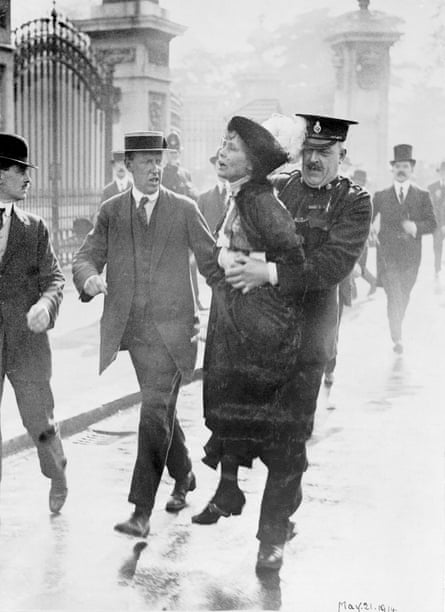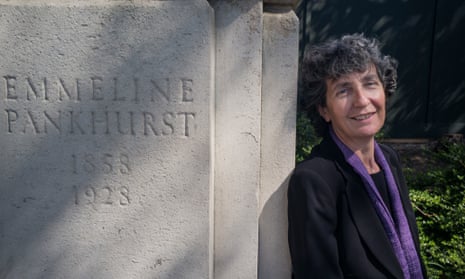Growing up in Africa, Helen Pankhurst was used to her surname being recognised. Her father, Richard, was a well-known historian in Ethiopia, and people often asked if she was related to him. But later, when she visited the UK, people picked up on a different connection. “They wanted to know if I was related to the suffragette leaders,” says Helen.
Emmeline Pankhurst – the steely Edwardian matriarch famously photographed being hoisted away from a protest at the gates of Buckingham Palace by a policeman – was Helen’s great-grandmother. Sylvia Pankhurst, who joined the Women’s Social and Political Union (WSPU), the pro-suffrage group Emmeline founded in 1903, was her grandmother; and suffragette leaders Christabel and Adela were her great-aunts. In October, a new film, Suffragette, will examine the struggle to get women the vote with Meryl Streep playing Emmeline. Helen and her daughter Laura have cameo roles as suffragette foot-soldiers.
Filming was a moving experience, says Helen, not only because it allowed her to taste the heady atmosphere of those days, but because it was also a chance to reconcile a split that divided her family for much of the 20th century.
Although the suffrage movement brought a step-change in British political life – after a long fight, women over 30 were finally given the right to vote in 1918 – it caused a lasting split in the Pankhurst family. At the root of the problem were political passions and tactics: for Emmeline and Christabel, the single cause of women’s emancipation was always uppermost, while for Sylvia and Adela it was socialism, the great cause of their father Richard – a founding member of the Independent Labour party – that became their guiding star.
That division cut deep. Emmeline and Christabel remained close, slightly oddly reinventing themselves as government propagandists during the first world war, but Sylvia and Adela became increasingly estranged from their mother. The final straw with Sylvia was when she and her Italian partner Silvio Corio, who were anti-marriage, had a baby (Helen’s father, Richard). Emmeline, surprisingly conventional on some issues,, found the idea of a child born outside of marriage hugely embarrassing and wouldn’t have anything to do with her daughter or her grandchild. At Emmeline’s funeral in 1928, Sylvia wept copiously, knowing that the rift between her and her mother could now never be healed. It was the last time she and Christabel were together: Sylvia later moved to Ethiopia, and Christabel to the US. Adela had already gone to live in Australia.
The divisions, says Helen, were palpable. “It was predominantly ideological, but it was also about tactics. Sylvia was not in favour of militancy, and felt that more could be achieved through mobilising women, particularly working-class women. Emmeline and Christabel thought you could only have change through militaristic behaviour.” But as well as the politics there were family issues bubbling away under the surface. “Sylvia had been there when her father Richard died, and Emmeline wasn’t, and you wonder whether that helped create the divide, maybe with feelings of guilt on both sides,” she says.
Helen, 50, had not expected to be involved in the movie until an email arrived, asking whether she would be willing to look at the script. “As soon as I saw it, I thought it was brilliant. It’s about the issues, not the personalities or the leadership. It’s about the gradual awareness of a woman who doesn’t consider herself a suffragette. It’s not just about the right to vote, it’s about awareness of women’s role in society as things started to change for them.”
Helen was hooked – and she, along with her 21-year-old daughter, Laura, accepted an invitation to take part in a day’s filming. “It was incredibly moving being in the mocked-up WSPU office,” she says. “It was like time travel: we were deposited in the middle of it, with all this noise around us, the bustle of it, the phone ringing, people making banners, and I thought: this is what it must have felt like, being there.”
One of the most harrowing aspects of the film is an enactment of the forced feeding of the hunger-striking suffragettes. “Witnessing the scene is shocking and reminds you just how courageous the suffragettes were, how barbarically they were treated and how much they suffered,” she says.
But, for her, the most important element of being involved is that it has felt like a symbolic way to bring her great-grandmother, grandmother and great-aunts back together. “I feel that, by being part of this film, I am representing them all and helping heal the split retrospectively. I’m equally proud of each one of them: I don’t agree with all their views, and if I’d been there at the time I’d probably have been involved in the split and I’d have taken sides. But I wasn’t there – I’m here. And from here, I feel I can be part of the healing.”

Although Helen’s early life wasn’t much affected by being a Pankhurst, the family legacy has played a much greater role since 2012. It started with another email – this time, from the organisers of the Olympics opening ceremony. They wanted volunteer actors to play the part of suffragettes – and who better, they thought, than the latter-day Pankhursts? Helen and Laura embraced the opportunity – and as would later happen with the movie, they were more deeply affected than they had expected. “It was incredibly powerful getting into costume: it made you identify with the suffragettes in a new way,” says Helen. “And when it was all over that night of the opening ceremony, I got up on a table and said to the other volunteers who represented the suffragettes, why don’t we keep this group together? So now we’ve got this group called the Suffs, and we take part in events and give talks in costume, which makes our message a lot more powerful.” During this year’s general election campaign, the Suffs took part in a drive to encourage younger women to use their votes, and they are regularly involved in an event called Walk in Her Shoes organised by the development agency Care International that takes place on International Women’s Day.
Helen hopes her famous ancestors would realise that, although they warred about which path was the right one to take for the cause they all cared so deeply about, in the end every tactic played its role, and they were all part of the victory and, indeed, the continuing story. She says that, as well as politics, she inherited the family work ethic: her father used to say he would wake up to find Sylvia working, and she would still be working when he went to bed. Sylvia’s big campaign, as well as women’s suffrage, was for an end to the fascist Italian occupation of Ethiopia in the 30s; she became a heroine there, and when she eventually visited the country in the 40s she was feted by Emperor Haile Selassie. A few years later, with Richard and his wife Rita, she returned to live in Ethiopia, earning the accolade of “honorary Ethiopian” when she died in 1960, a few years before Helen’s birth.
“I was always interested in the less powerful people in the world, and I could see there were parallels with what Emmeline and Christabel and Sylvia and Adela had fought for,” Helen says. She has spent her life between the UK and Ethiopia, but her work in recent years has been with Care International on a range of programmes focusing on women’s empowerment and their practical constraints, such as the burden of daily water collection in Ethiopia. “In many parts of the world, women’s lives continue to be defined by a level of domestic drudgery, which just shouldn’t be acceptable in the 21st century,” she says. It’s a sentiment her great-grandmother, as well as her grandmother and great-aunts, would surely have endorsed.

Comments (…)
Sign in or create your Guardian account to join the discussion